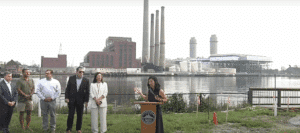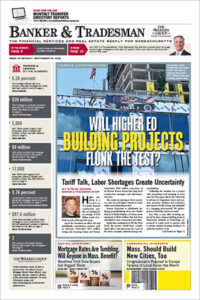Boston Mayor Michelle Wu pressed The Kraft Group to provide “meaningful technical information” on its Everett soccer stadium proposal, claiming Boston is unable to negotiate community benefits without more details.
The 25,000-seat New England Revolution stadium would include only 75 parking spaces on-site. The nearest MBTA station is located in Charlestown’s Sullivan Square, about a 20-minute walk from the site.
“The city of Boston has asked The Kraft Group for basic information about the stadium’s impacts on transportation, noise, jobs, inclusion, our air and water: the daily impacts felt by our residents,” Wu said at a morning press conference. “We haven’t asked for anything extraordinary for any significant development, much less a megadevelopment like this one.”
The Kraft Group’s informal offer of $750,000 to Boston has remained unchanged, Wu said.
“$750,000 in mitigation to the city of Boston: that is a non-starter. It is an unserious proposal,” Wu said, adding that Boston is pressing for additional benefits on job preferences and climate resilience.
Wu, local officials and community activists said the Charlestown neighborhood already receives a disproportionate share of noise, traffic and pollution.
Under state legislation approved last year, The Kraft Group is required to negotiate community benefits agreements with both Everett and Boston.
A May 1 deadline passed without agreements, triggering the appointment of a mediator. Former Massport executive Thomas Glynn has been named to the role.
The Kraft Group did not immediately respond to a request for comment.
State Sen. Sal DiDomenico, whose district includes the city of Everett and Boston’s Charlestown neighborhood, said The Kraft Group has transportation studies under way
“I am very interested in seeing what that looks like,” DiDomenico said.
The project will require an extensive review under the Massachusetts Environmental Policy Act, DiDomenico noted.
Mitigation should include off-site parking, shuttle services and improved pedestrian infrastructure, Boston’s Deputy Chief of Transportation Nick Gove said. Traffic on Route 99, which includes Alford Street, currently exceed 43,000 vehicles per day.
The New England Revolution owners settled on the 43-acre Alford Street property containing a recently decommissioned power plant as a replacement for their current home at Gillette Stadium in Foxborough.
The project cleared a major hurdle last year when Gov. Maura Healey signed legislation removing the property from a designated port area, a zoning regulation that limits development to marine-oriented uses.
The legislation required The Kraft Group to negotiate with both Everett and Boston on community benefits.
Wu and local officials said the project should address a history of environmental contamination and pollution along the industrial waterfront.
Joshua Kraft, Wu’s leading opponent in this fall’s mayoral race and the son of Kraft Group founder Robert Kraft, has said he would recuse himself from negotiations on the stadium project if elected.









